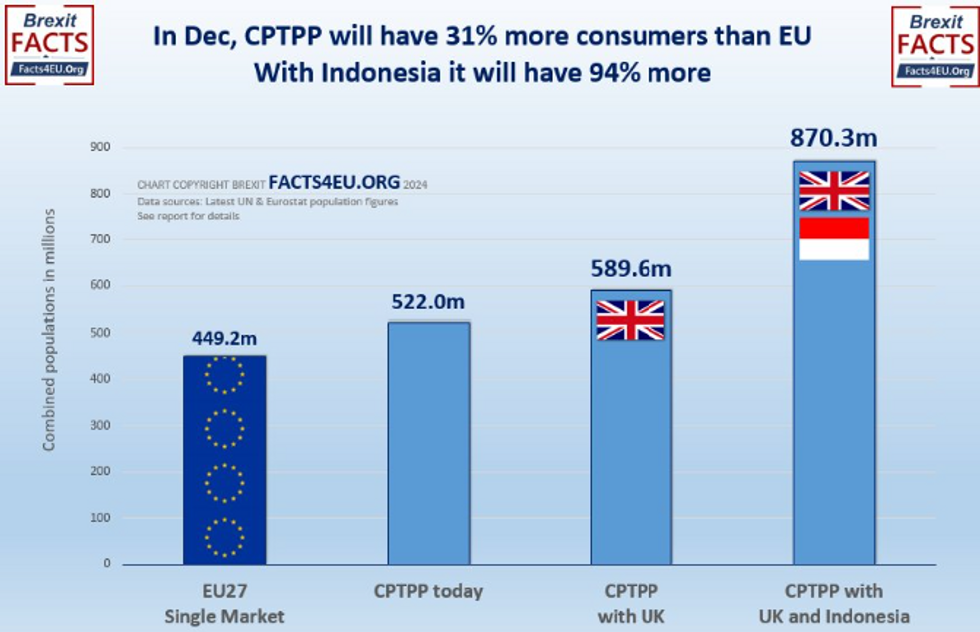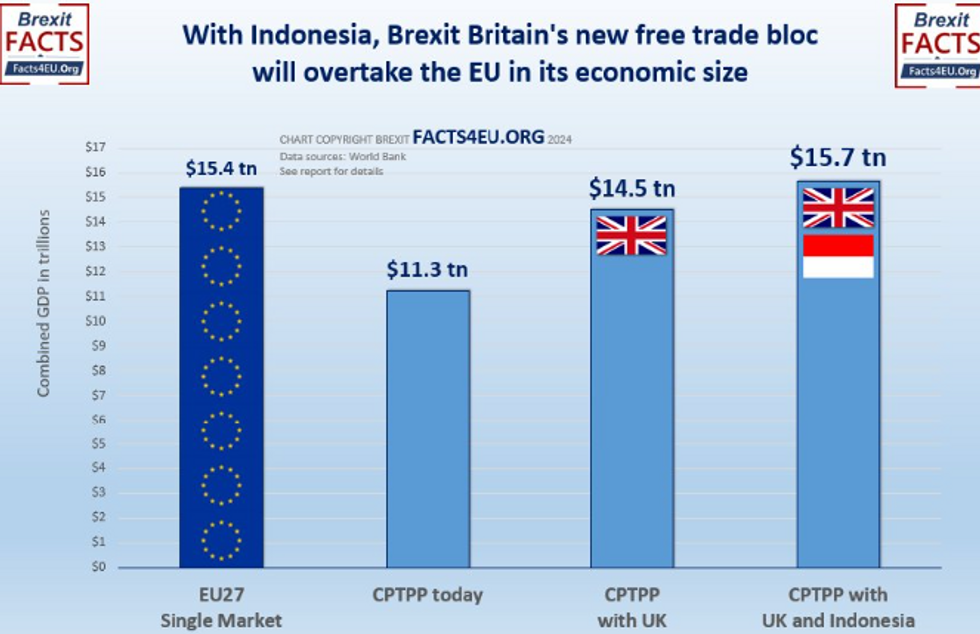GB News Reporter
Guest Reporter

In August, it was announced Britain would join the ‘Comprehensive and Progressive Agreement for Trans-Pacific Partnership' (CPTPP), one of the world’s largest trading blocs with more than 500 million people, with benefits starting in December.
A joint investigation by Facts4EU, CIBUK.Org and GB News reveals the bloc will soon outnumber the EU’s ‘Single Market’ with a larger combined GDP and 94 per cent more consumers.
The CPTPP is a free trade agreement between 11 countries in the Asia-Pacific region: Australia, Brunei, Chile, Canada, Japan, Malaysia, Mexico, New Zealand, Peru, Singapore and Vietnam.
The six countries which have now ratified the deal are Japan, Singapore, Chile, New Zealand and Peru.
CPTPP's consumers set to exceed EU's by 94%

Assuming it joins, Indonesia’s 281 million people will take the CPTPP past the size and value of the EU’s Single Market and Customs Union.
By the time Indonesia joins, the CPTPP’s extra economic size will be even larger than the EUs, as the CPTPP countries are growing faster than the EU27.
Indonesia’s Minister for Economic Affairs, Airlangga Hartarto commented: The Indonesian government has officially requested New Zealand as the Depository Country of the CPTPP to start the accession process from Indonesia and thank God they welcomed Indonesia’s proposal.
“Today we are discussing with friendly countries that have joined to help Indonesia join and become part of the CPTPP.”
Indonesia has the fourth largest population in the world (280.7 million) and the 16th largest GDP ($1.18 trillion) with a growth rate of 5.0 per cent.
It also has over 100 million internet users, and is the world’s largest Facebook market and fifth-largest Twitter market.
Demand from the new middle class is increasing for modern retail and consumer goods, healthcare, education and professional qualifications, transport, construction and manufacturing.
UK companies are already flourishing in Indonesia, some with a presence that stretches back over 100 years. Major UK businesses operating in Indonesia include BP, Unilever, Shell, Standard Chartered Bank, Prudential, Rolls Royce and GlaxoSmithKline.
The UK is the second largest exporter of services in the world and the majority of these were delivered by digital means.
Easing digital trade via Indonesia’s pending accession to the CPTPP could unleash growth in UK services exports, already worth £658 million to Indonesia last year.
Amongst other areas, there are opportunities for increased collaboration in areas such as food and drink, agriculture, education services, Indonesia’s energy transition, legal services and fintech.
Being part of the CPTPP, which Britain could not have done if it had still been a member of the EU, has a number of non-quantifiable benefits including cutting costs for British consumers of imported goods and providing more choices.
CPTPP's GDP also set to exceed EU's

LATEST FROM MEMBERSHIP:
- Expat secrets: Where you should live in Spain and why 'it is very personal'
- Foot care: Avoid detrimental showering habit to achieve 'baby-soft' soles at home
- 'Hundreds of thousands of people are missing from the workforce - how do we solve a problem like sick note Britain?'
Catherine McBride, a Member of the Government's Trade and Agriculture Commission said: "The UK’s consumers will have improved access to a wide range of products. Examples include Vietnam’s and Malaysia’s clothing and footwear, to Malaysian palm oil, Canada’s wheat and soybean foodstuffs" and much more.
McBride added: "Many of these items are already imported by the UK from CPTPP countries but joining the CPTPP will simply remove the tariffs and quotas left over from our EU membership or the rolled-over EU trade deals. This should lead to lower prices for UK consumers as well as increased choice."
Furthermore, there is an important counter-seasonal nature of imports from CPTPP countries.
McBride explained: "The largest food exporters in the CPTPP are either in the southern hemisphere and so produce food in the opposite season to the UK and the EU or they are in the tropics and produce foods that can not be grown in the UK climate.
"Fears of UK farmers being driven out of business by imported food from the CPTPP are simply made up by people who haven’t even bothered to read the publicly available trade document."
Find Out More...








